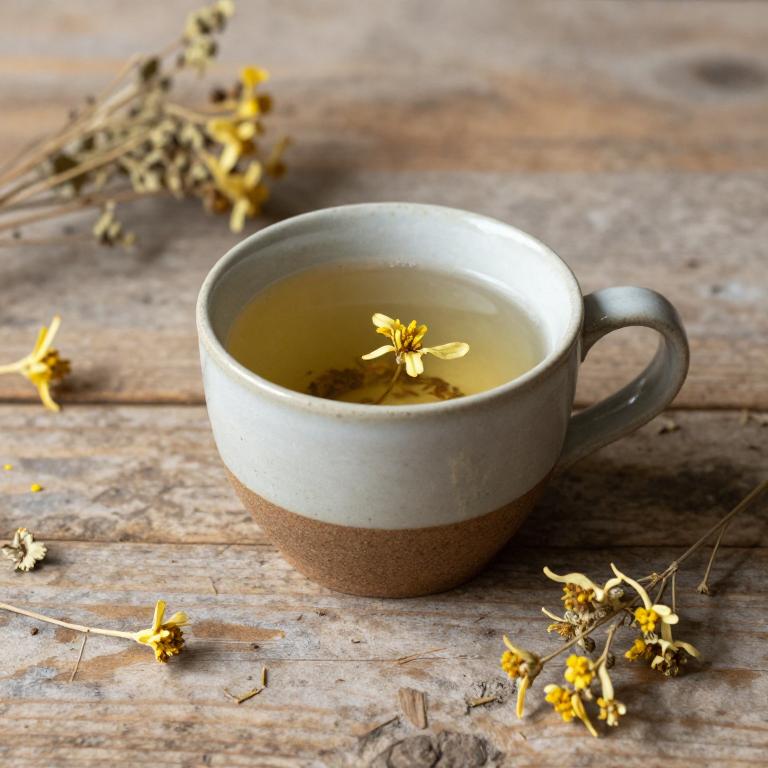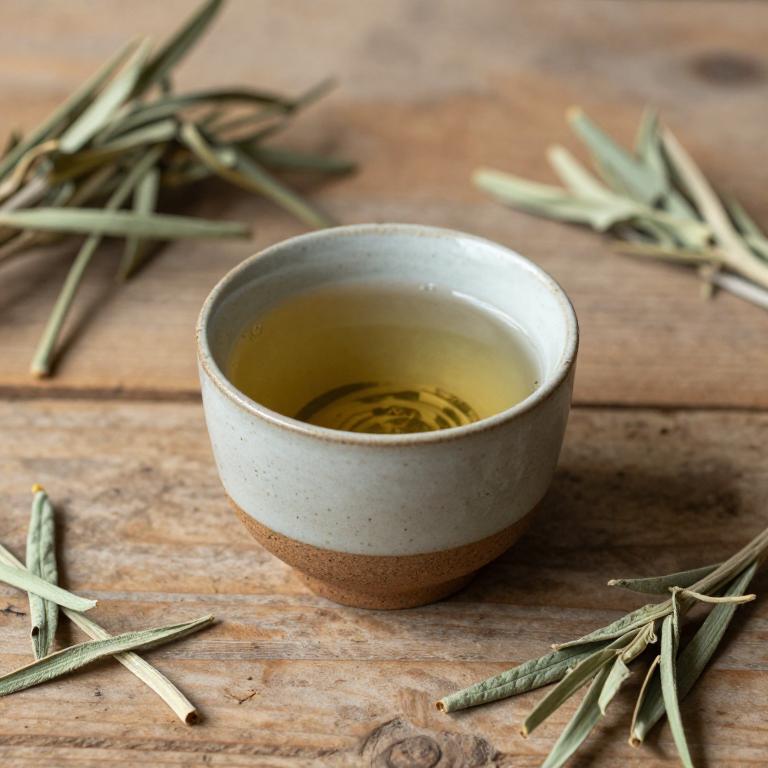10 Best Herbal Teas For Excessive Sweating

Herbal teas can be a natural and effective remedy for managing excessive sweating, often referred to as hyperhidrosis.
Certain herbs, such as green tea, sage, and peppermint, are known for their cooling and calming properties that may help regulate body temperature and reduce perspiration. These teas work by supporting the body's natural balance and promoting relaxation, which can alleviate stress-induced sweating. Additionally, herbal teas are generally safe to consume and can be customized to suit individual preferences and health needs.
Incorporating these teas into a daily routine may offer a gentle and holistic approach to reducing excessive sweating.
Table of Contents
- 1. St. john's wort (Hypericum perforatum)
- 2. Rosemary (Rosmarinus officinalis)
- 3. Valerian (Valeriana officinalis)
- 4. Stinging nettle (Urtica dioica)
- 5. Camellia (Camellia sinensis)
- 6. Peppermint (Mentha piperita)
- 7. English lavender (Lavandula angustifolia)
- 8. Echinacea (Echinacea purpurea)
- 9. Lemon grass (Cymbopogon citratus)
- 10. Salvia (Salvia officinalis)
1. St. john's wort (Hypericum perforatum)

Hypericum perforatum, commonly known as St. John's wort, is traditionally used in herbal teas to address excessive sweating, particularly in cases of night sweats and hot flashes.
This herb contains active compounds like hypericin and hyperforin, which are believed to have anticholinergic and mild sedative effects that may help regulate body temperature and reduce perspiration. While some studies suggest it may have a calming influence on the nervous system, its effectiveness for excessive sweating remains inconclusive and requires further scientific validation. It is often used in combination with other herbs in herbal formulations to enhance its therapeutic potential.
However, due to potential interactions with medications and side effects, it is important to consult a healthcare professional before use.
2. Rosemary (Rosmarinus officinalis)

Rosmarinus officinalis, commonly known as rosemary, is a versatile herb often used in herbal teas to address excessive sweating, particularly in cases of night sweats or hyperhidrosis.
The essential oils in rosemary, such as cineole and camphor, are believed to have a cooling effect on the body, helping to regulate body temperature and reduce perspiration. Drinking rosemary tea may also promote relaxation and reduce stress, which is a common trigger for increased sweating. Additionally, its antioxidant and anti-inflammatory properties support overall health, making it a beneficial addition to a holistic approach for managing excessive sweating.
However, it is important to consult with a healthcare provider before using rosemary tea, especially for individuals with certain medical conditions or those taking medications.
3. Valerian (Valeriana officinalis)

Valeriana officinalis, commonly known as valerian, is a traditional herbal remedy often used in the form of tea to address various health concerns, including excessive sweating.
This herb is believed to have calming properties that may help regulate the body's autonomic nervous system, potentially reducing sweat production. Valerian root tea is typically prepared by steeping the dried root in hot water for several minutes, allowing the active compounds to be extracted. While some studies suggest that valerian may help with stress-related sweating, more research is needed to confirm its effectiveness for this specific use.
As with any herbal remedy, it is advisable to consult a healthcare professional before incorporating valerian into a treatment regimen for excessive sweating.
4. Stinging nettle (Urtica dioica)

Urtica dioica, commonly known as stinging nettle, is a herbal plant that has been traditionally used for its various health benefits, including its potential to help manage excessive sweating.
When brewed into a tea, stinging nettle is believed to support the body's natural detoxification processes, which may help reduce symptoms associated with hyperhidrosis. The tea is rich in minerals such as potassium and magnesium, which can help regulate body temperature and balance electrolytes, potentially reducing sweat production. While scientific research on its effectiveness for excessive sweating is limited, many users report a calming effect that may indirectly help with stress-related sweating.
As with any herbal remedy, it is advisable to consult a healthcare professional before incorporating urtica dioica tea into a treatment regimen for excessive sweating.
5. Camellia (Camellia sinensis)

Camellia sinensis, the plant from which green, black, and white teas are derived, contains bioactive compounds such as caffeine, theanine, and polyphenols that may influence body temperature and sweat regulation.
Some studies suggest that the thermogenic effects of Camellia sinensis may help reduce excessive sweating by promoting metabolic activity and enhancing the body's ability to regulate heat. However, the impact of herbal teas made from Camellia sinensis on hyperhidrosis varies depending on individual physiology and the specific preparation method. While some people report reduced sweating after consuming these teas, scientific evidence supporting their efficacy for excessive sweating is limited.
It is advisable to consult a healthcare professional before using Camellia sinensis-based teas as a treatment for hyperhidrosis.
6. Peppermint (Mentha piperita)

Mentha piperita, commonly known as peppermint, is a popular herb used in herbal teas to help manage excessive sweating.
The cooling properties of peppermint can help reduce body heat and promote a calming effect, which may help regulate sweat production. Peppermint tea is often recommended for its ability to soothe the nervous system and reduce anxiety, a common trigger for excessive sweating. It is typically consumed warm and can be combined with other calming herbs like lemon balm or chamomile for enhanced benefits.
While peppermint tea is generally safe, individuals with certain health conditions or those taking medications should consult a healthcare provider before regular use.
7. English lavender (Lavandula angustifolia)

Lavandula angustifolia, commonly known as English lavender, is often used in herbal teas to help manage excessive sweating, particularly in cases of hyperhidrosis.
The calming properties of lavender are believed to support the body's natural regulatory systems, potentially reducing stress-induced sweating. When brewed as a tea, lavender contains compounds like linalool and lavandin, which may have mild anticholinergic effects that can decrease sweat production. Many people find that regular consumption of lavender tea promotes a sense of relaxation, which can indirectly help control sweating by reducing anxiety and nervousness.
While it is not a cure for excessive sweating, lavender tea can be a soothing complementary remedy when used alongside other medical treatments.
8. Echinacea (Echinacea purpurea)

Echinacea purpurea, commonly known as purple coneflower, is a popular herbal remedy often used to support immune function and reduce inflammation.
While it is traditionally valued for its potential to alleviate colds and boost the immune system, some studies suggest it may also have a role in managing excessive sweating, or hyperhidrosis. The herb contains compounds like alkamides and caffeic acid, which may influence sweat gland activity by modulating the nervous system. Echinacea herbal teas are typically prepared by steeping the dried flower heads in hot water, and they are often consumed as a natural alternative to conventional treatments for sweating.
However, it is important to consult a healthcare professional before using echinacea, especially for individuals with underlying health conditions or those taking medications.
9. Lemon grass (Cymbopogon citratus)

Cymbopogon citratus, commonly known as lemon grass, is a popular herbal tea used to address excessive sweating, particularly in cases of hyperhidrosis.
This aromatic herb contains compounds like citral and myrcene, which have natural antispasmodic and anti-inflammatory properties that may help regulate body temperature and reduce sweat production. Lemon grass tea is often consumed as a calming drink, offering both physical and mental benefits due to its mild sedative effects. Its ability to support the body's natural cooling mechanisms makes it a valuable remedy for individuals experiencing persistent or excessive sweating.
Regular consumption of lemon grass tea may help alleviate symptoms and promote overall wellness when used as part of a holistic approach to managing hyperhidrosis.
10. Salvia (Salvia officinalis)

Salvia officinalis, commonly known as sage, has been traditionally used in herbal teas to help manage excessive sweating, particularly in conditions like hyperhidrosis.
The plant contains compounds such as rosmarinic acid and flavonoids, which may help regulate body temperature and reduce sweat production. Sage tea is often prepared by steeping dried leaves in hot water, and it is believed to have a calming and antispasmodic effect on the body. Some studies suggest that sage may influence hormonal balance, which can play a role in controlling sweat glands.
While it is generally considered safe when consumed in moderation, it is advisable to consult a healthcare professional before using sage tea for persistent excessive sweating.